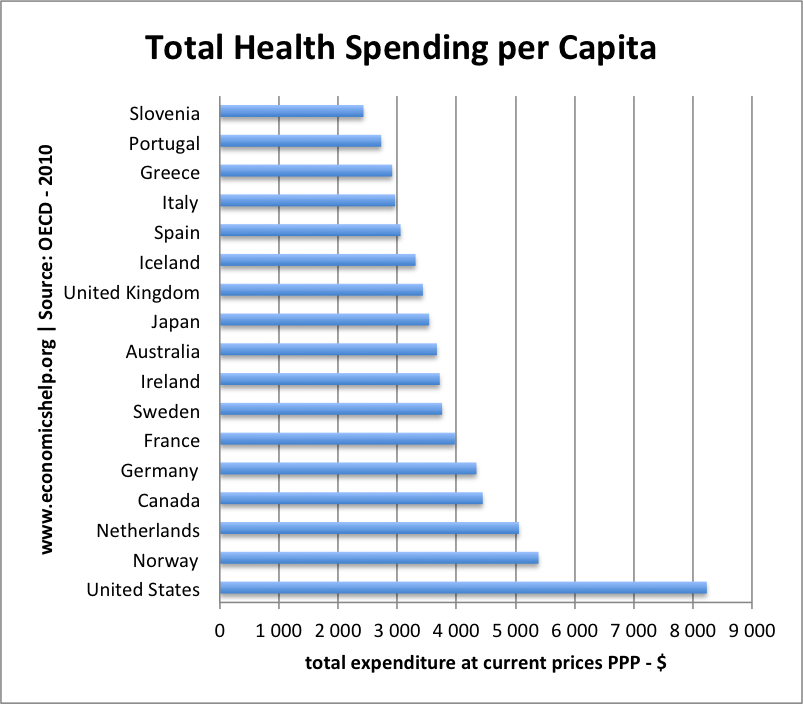Readers Question: The recent issue of health insurance coverage (the fact that everyone must have it or pay a penalty, and that this is causing everyone’s premiums to go up) has me wondering: why can’t the U.S. simply lower overall costs of everything, not just health insurance, but medical treatment costs, as well as all costs of living/all merchandise of any kind, but not lower anyone’s wages?
Yes, the US could reduce health care costs as a % of GDP without lowering wages and with only a minimal effect on health care standards.
The US spends more on health care than anywhere else in the world.

Note, this is health care spending per capita – and the US has one of the highest per capita incomes in the world.
For all the money the US spend on health care, there isn’t a significant improvement in living standards.
| % of health care spending as % of GDP | Govt spending as % of total health care | Per Capita expenditure 2006 (PPP) | Doctors per 10,000 population | Nurses / midwives per 10,000 | Hospital beds per 10,000 | Life Expectancy | male obesity | ||
| UK | 8.2 | 87.3 | 2815 | 23 | 128 | 39 | 80 | 22% | |
| US | 15.3 | 45.3 | 6719 | 26 | 94 | 31 | 78 | 31% |
US health care costs were 7% of GDP in 1970. UK was 4% of GDP in 1970 (Runaway health care costs) Health care costs have been rising very fast in the past few decades. Aspects of the way private health care insurance is set up means this is more likely.
Why does the US spend so much on health care?
Private health care. The US is unique amongst Western economies for having health care provision which is predominantly based on private health insurance. In Western Europe, health care is provided free at the point of use and is funded by taxes.
Private health care leads to higher costs because
Profit. Private health care firms and private health insurance companies take a profit margin from the provision of health. This leads to higher prices for health care, than a non-profit making health care system.
Higher wages for medical staff. To attract the best staff, private health care leads to significantly higher salaries for doctors. In the West, doctors are paid a salary determined by the government – not market forces. The wages of doctors and consultants in the US is significantly higher than the UK.
Most expensive treatment. Private health care insurance encourages the most expensive treatment. On a state provided health care system, doctors will have to prioritise the most valuable treatments. With limited budgets, there may be an unwillingness to spend money on very expensive drugs for only a very marginal improvement in quality of life. However, with a private insurance scheme, the doctor has the incentive to recommend the most expensive treatment, regardless of cost, because it will be insurance companies who pay for it anyway. If insurance companies have to spend more on treatments, they just put up general health care premiums which are spread throughout the population.
Extra layers of bureaucracy. With a state provided NHS style system. A patient is treated directly. However, in the US, there is the bureaucracy of signing up to health insurance. Then there is the bureaucracy of claiming for treatment (in addition to stress of not knowing whether it will be met). All these costs are absorbed into higher health care premiums.
If the US switched to a single payer system, there would be the potential for significant savings in the overall cost of health care. Taxes may rise, but the amount spent on health insurance by firms and workers would fall. In a sense employer and employee contributions to health insurance are a form of tax – they are just going to private insurance companies rather than the government.
The reason the US will never switch to a single payer system is that there are too many vested interests (doctors, private insurance companies) who do well out of the money spent on health care.
Related
